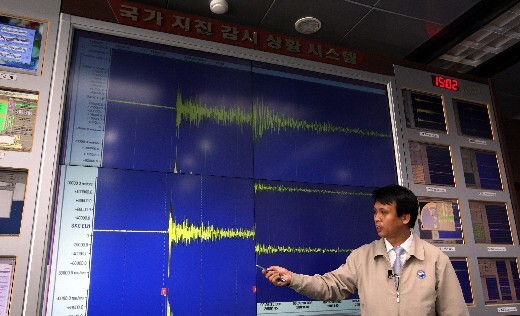hankyoreh
Links to other country sites 다른 나라 사이트 링크
[Analysis] N. Korea challenges U.S.’s “benign neglect” policy with second nuclear test

North Korea’s nuclear test on Monday appears to fall in line with its all-out strategy to heighten the crisis. It may have also decided that because it is not in the middle of negotiations that it would not suffer anything more than the sanctions it has already received for its recent rocket launch.
North Korea’s warning of additional self-defense nuclear deterrent measures came through a North Korean foreign ministry statement on April 29. It was a direct response to the U.S. and others for both the United Nations Security Council (UNSC) president’s statement supporting sanctions against North Korea on April 5, and the UNSC Sanctions Committee decision to sanction three North Korean companies on April 25.
When North Korea pledged to conduct nuclear tests in the past, the only alternative was to resolve the situation through negotiations otherwise North Korea would push through with the nuclear test.
In contrast and while it did not get much attention at the time, there was something different about the last foreign ministry statement from North Korea. The part that said if the “UN Security Council didn‘t immediately apologize,” North Korea would take “additional self-defense measures” was different. North Korea imposed an impossible condition, and consequently, one can see that North Korea was already fixated on conducting a nuclear test.
Gary Samore, a White House coordinator for weapons of mass destruction policy and a key figure handling U.S.’s North Korea policy, appeared to speak along these lines on May 1, immediately after North Korea’s statement had been presented, when he said a second nuclear test from North Korea was likely and it seemed like it wanted to pick a fight.
North Korea moved according to its own logic and schedule. After declaring on the April 14 that it would not be held to any agreements made during the six-party talks, it began moving rapidly towards reprocessing nuclear fuel rods. On May 4, it condemned and equated the Obama and Bush administrations. On May 8, it claimed that talks would be fruitless as there was nothing to be gained by sitting down with a U.S. that continues to view North Korea with hostility. Stephen Bosworth, the U.S. special representative for North Korea policy, predicted the possibility that China would send a special envoy to North Korea around the time of his tour of six-party talks participants, but China did not move. It is very likely that China, too, judged it could not stop a nuclear test by North Korea.
However, there are questions about why North Korea has taken such a strong measure less than a month after issuing an announcement through its Foreign Ministry. One could believe that the U.S.’s approach of so-called “benign neglect” was a factor. Peter Beck, a professor at American University who is close to Obama administration officials, said he had heard that the administration had decided to not engage with North Korea further, and to wait until either North Korea steps forward with a rational attitude or China twists its arm to act rationally.
The issue facing us now is whether the nuclear test can lead to negotiations. Led by the U.S., the UNSC could slap additional sanctions on North Korea. Moreover, China could take more punitive measures, but each country does not believe the problem can be solved through sanctions, as evidenced by the course of events that have taken place since North Korea’s first nuclear test. It is predicted that the only thing that will change as a result of the second nuclear test is the course leading to negotiations, not the goal of a resolution through negotiations.
Please direct questions or comments to [englishhani@hani.co.kr]
Editorial・opinion
![[Column] Park Geun-hye déjà vu in Yoon Suk-yeol [Column] Park Geun-hye déjà vu in Yoon Suk-yeol](https://flexible.img.hani.co.kr/flexible/normal/500/300/imgdb/original/2024/0424/651713945113788.jpg) [Column] Park Geun-hye déjà vu in Yoon Suk-yeol
[Column] Park Geun-hye déjà vu in Yoon Suk-yeol![[Editorial] New weight of N. Korea’s nuclear threats makes dialogue all the more urgent [Editorial] New weight of N. Korea’s nuclear threats makes dialogue all the more urgent](https://flexible.img.hani.co.kr/flexible/normal/500/300/imgdb/original/2024/0424/7317139454662664.jpg) [Editorial] New weight of N. Korea’s nuclear threats makes dialogue all the more urgent
[Editorial] New weight of N. Korea’s nuclear threats makes dialogue all the more urgent- [Guest essay] The real reason Korea’s new right wants to dub Rhee a founding father
- [Column] ‘Choson’: Is it time we start referring to N. Korea in its own terms?
- [Editorial] Japan’s rewriting of history with Korea has gone too far
- [Column] The president’s questionable capacity for dialogue
- [Column] Are chaebol firms just pizza pies for families to divvy up as they please?
- [Column] Has Korea, too, crossed the Rubicon on China?
- [Correspondent’s column] In Japan’s alliance with US, echoes of its past alliances with UK
- [Editorial] Does Yoon think the Korean public is wrong?
Most viewed articles
- 1‘We must say no’: Seoul defense chief on Korean, USFK involvement in hypothetical Taiwan crisis
- 2Will NewJeans end up collateral damage in internal feud at K-pop juggernaut Hybe?
- 3[Column] Park Geun-hye déjà vu in Yoon Suk-yeol
- 4Why Korea shouldn’t welcome Japan’s newly beefed up defense cooperation with US
- 5Thursday to mark start of resignations by senior doctors amid standoff with government
- 6N. Korean hackers breached 10 defense contractors in South for months, police say
- 7[Guest essay] The real reason Korea’s new right wants to dub Rhee a founding father
- 8[Column] ‘Choson’: Is it time we start referring to N. Korea in its own terms?
- 9Kim Jong-un expressed ‘satisfaction’ with nuclear counterstrike drill directed at South
- 10[Editorial] New weight of N. Korea’s nuclear threats makes dialogue all the more urgent